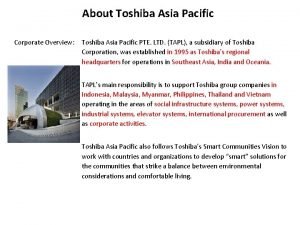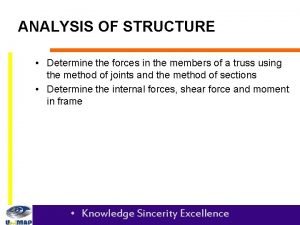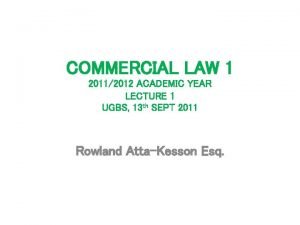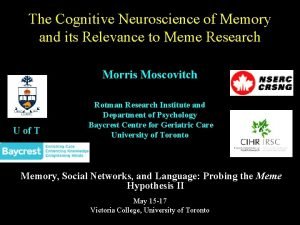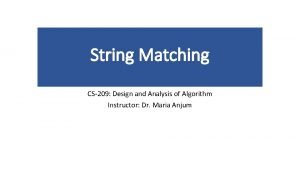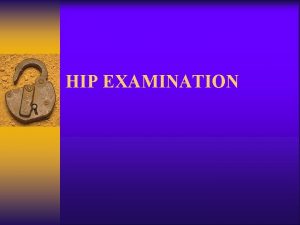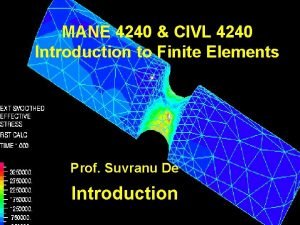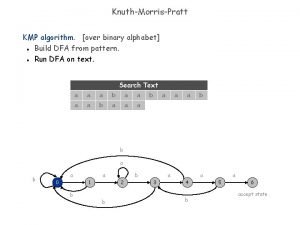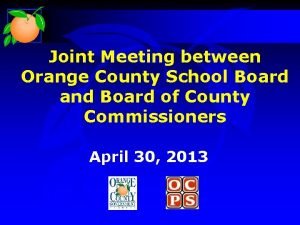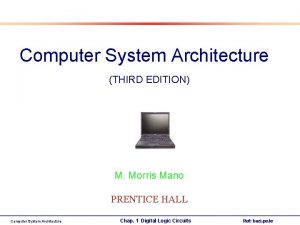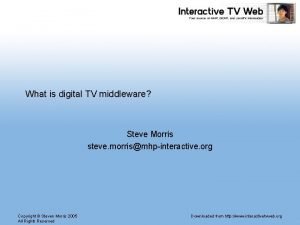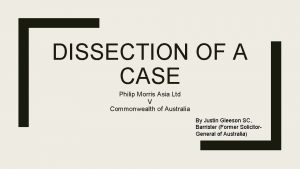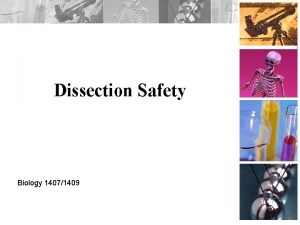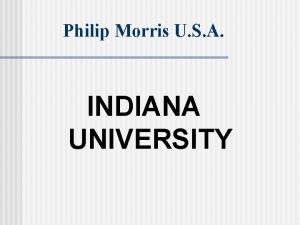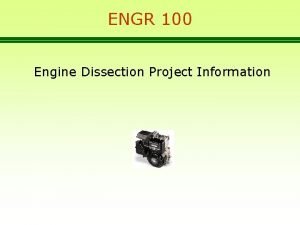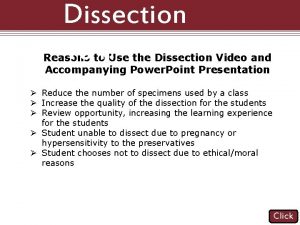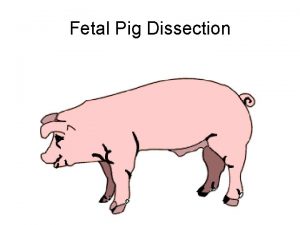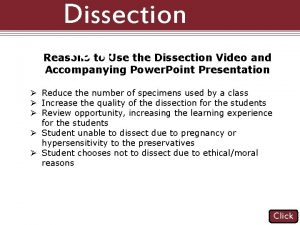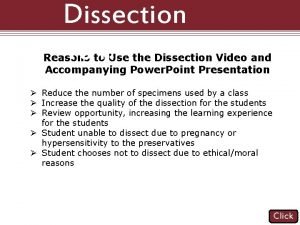DISSECTION OF A CASE Philip Morris Asia Ltd























![Philip Morris succeeds on admission of its investment: [511]-[523] ■ Philip Morris had received Philip Morris succeeds on admission of its investment: [511]-[523] ■ Philip Morris had received](https://slidetodoc.com/presentation_image_h/34de7c7aba9b9c6f8adafa5374935f64/image-24.jpg)
![Philip Morris succeeds on the ratio temporis objection: [524]-[534] ■ Australia had argued that Philip Morris succeeds on the ratio temporis objection: [524]-[534] ■ Australia had argued that](https://slidetodoc.com/presentation_image_h/34de7c7aba9b9c6f8adafa5374935f64/image-25.jpg)
![Australia succeeds on abuse of right objection: [535]-[569] ■ Tribunal holds that an ISDS Australia succeeds on abuse of right objection: [535]-[569] ■ Tribunal holds that an ISDS](https://slidetodoc.com/presentation_image_h/34de7c7aba9b9c6f8adafa5374935f64/image-26.jpg)
![Philip Morris’ defences to abuse of right rejected: [506]-[509], [570]-[584] ■ Philip Morris failed Philip Morris’ defences to abuse of right rejected: [506]-[509], [570]-[584] ■ Philip Morris failed](https://slidetodoc.com/presentation_image_h/34de7c7aba9b9c6f8adafa5374935f64/image-27.jpg)









- Slides: 36

DISSECTION OF A CASE Philip Morris Asia Ltd V Commonwealth of Australia By Justin Gleeson SC, Barrister (Former Solicitor. General of Australia)

Case References ■ Philip Morris Asia Ltd v Commonwealth of Australia PCA Case No 2012 -12 Ø Procedural Order No 8 Regarding Bifurcation of Procedure 14 August 2014 Ø Award on Jurisdiction and Admissibility 17 December 2015 Ø Final Award Regarding Costs 8 March 2017 Ø Access at http: //www. pcacases. com/web/view/5 § Compare: Philip Morris Brands SARL v Republic of Uruguay, ICSID case No ARB/10/7 Ø Award 8 July 2016 Ø Access at http: //icsidfiles. worldbank. org/icsid/ICSIDBLOBS/Online. Awards/C 1000/DC 9012_En. pdf

Index ■ Australia works up a public heath measure ■ Philip Morris engages in a corporate restructure ■ Australia legislates for the measure ■ The nature of Philip Morris’ ISDS challenge ■ Australia defends on jurisdiction/admissibility and the merits ■ Tribunal orders bifurcation of hearing ■ Result of the bifurcated hearing ■ Merits not reached (cf Philip Morris v Uruguay) ■ Costs orders ■ Lessons

AUSTRALIA WORKS UP A PUBLIC HEALTH MEASURE

Australia commences to build a case for Standardized Packaging. . . ■ Widespread recognition that tobacco is dangerous to public health ■ WHO Framework on Tobacco Control creates international obligations for Australia ■ WHO identifies Standardized Packaging (SP) as one possible additional measure ■ No previous country has adopted SP ■ Australia commences to work up an evidentiary base for SP ■ Australia commences down internal regulatory paths before introducing SP ■ Philip Morris International voices vigorous public opposition to SP ■ 29 April 2010: Australian Prime Minister Rudd announces Government committed to SP

A diversion: Parliamentary democracy in Australia ■ Australia has a written Constitution from 1901 which observes a separation of powers between Parliament (the legislature), the Executive and the Judiciary ■ Modelled on the United States Constitution, but also observes Responsible Government from the United Kingdom ■ Ministers of the Executive must hold seats in the Parliament ■ The Ministers and Prime Minister need to hold the support of the Lower House of Parliament, usually by their party holding a majority in the Lower House ■ The Prime Minister “announces” SP on 29 April 2010, meaning that the Executive intends, subject to any further consideration/consultation, to introduce draft legislation into the Parliament to legislate for SP ■ SP cannot become law unless and until the Parliament passes legislation

The Prime Minister’s announcement raises potential ISDS questions. . . ■ Question one: The statement of intention by Prime Minister Rudd means the Executive will work towards introducing the necessary legislation for the Parliament to consider. But only the Parliament can make the ultimate decision. At what point is the measure (SP) to be regarded as “adopted” by Australia sufficient for Philip Morris to bring an ISDS challenge? ■ Question two: And at what point in time must Philip Morris consider that SP is a sufficiently definite prospect that its ISDS choices are “frozen” and it should not engage in corporate restructures to improve its chances? ■ Question three: The PM’s statement of intention comes in advance of the Australian bureaucracy completing all its internal evidentiary and regulatory review processes to consider whether SP is appropriate and if so in what form. Does that mean Australia faces a later ISDS claim that the Executive has interrupted a fair and reasonable process for the introduction of a new measure?

And then something political happens. . . ■ On 24 June 2010, Prime Minister Rudd is deposed by his own party. Julia Gillard is elected party leader and made Prime Minister ■ PM Gillard commits to continue to work to introduce SP ■ PM Gillard faces an immediate election. No clear result for 17 days. Parliament is “hung” ■ Eventually PM Gillard forms a minority Government on 14 September 2010. That is, forms Government only with the support of independents in the Lower House ■ PM Gillard and her party remain publicly committed to SP ■ PM Gillard cannot be assured that SP will pass the Parliament. Her party does not have secure “numbers” in either House of Parliament. But remains committed to it. ■ The main opposition party keeps its powder dry whether it will support SP legislation

Meantime, the Philip Morris group has been at work. . . ■ The Philip Morris group has not been idle. ■ Publicly, it has mounted a strong campaign of opposition to SP on grounds: Ø SP will amount to an indirect expropriation of valuable trademarks Ø There is insufficient evidence that SP will achieve its objectives Ø SP will be counter-productive as it will encourage illicit trade and drive up smoking Ø Australia has not done its homework thoroughly enough § Privately, it has been considering a corporate restructure. . .

PHILIP MORRIS ENGAGES IN A CORPORATE RESTRUCTURE

A look at the Philip Morris restructure ■ The restructure was decided upon on 3 September 2010 (Just after the election and before PM Gillard is returned as leader of the minority government) ■ The restructure was completed on 23 February 2011 ■ Ownership of the Philip Morris Australia entities moved from a Philip Morris Swiss company to a Philip Morris Hong Kong company ■ Australia has no ISDS obligations with Switzerland; it does have with Hong Kong ■ It later emerges (only in the later arbitration) that the Philip Morris group admits one of the reasons for the restructure was to take advantage of the ISDS provision in the Hong Kong if Australia went ahead with SP ■ Philip Morris says (in the later arbitration) it had other good commercial and tax reasons to restructure independent of getting ISDS protection

What was Australia told about the restructure? ■ Under Australian domestic statute, the restructure needs the consent of the Australian Treasurer, as it involves the change in foreign ownership of a company doing business in Australia ■ In February 2011, Philip Morris seeks that consent, describing it as an internal group restructure. No mention of ISDS thinking ■ Australian Treasury has knowledge of the Hong Kong-Australia BIT and the ISDS provision ■ The actual decision maker does not put “ 2 and 2” together. Does not realize that the restructure may have ISDS implications

AUSTRALIA LEGISLATES FOR THE MEASURE

During 2011 SP is passed into law in Australia ■ 23 February 2011: Philip Morris restructure completed ■ 6 April 2011: draft SP legislation introduced into Parliament ■ 15 July 2011: Philip Morris group gives notice of intent to sue Australia under Hong-Kong Australia 1993 BIT (1993 BIT) ■ 21 November 2011: Australian Parliament passes SP legislation ■ 21 November 2011: Philip Morris serves notice of arbitration under UNCITRAL rules

THE PHILIP MORRIS’ ISDS CHALLENGE

The challenge under the Hong-Kong Australia BIT ■ Philip Morris Asia argues: Ø that its investment in the Philip Morris Australian companies is “admitted” as an investment under the 1993 BIT in accordance with Australian law and policies Ø That the SP legislation is an indirect expropriation of the investment, failing to provide the necessary due process and compensation (note this clauses did not contain express carve out for legitimate public health and safery measures) Ø That Australia’s process for adopting SP did not accord fair and equitable treatment to Philip Morris Ø Philip Morris says it seeks “billions” of dollars in damages ■ Note that Philip Morris also brought a domestic challenge that the SP legislation was an acquisition of the Australian trademark property of Philip Morris Australia without supplying just terms, in breach of the guarantee in s 51(xxxi) of the Constitution. Challenge later fails ■ Note also that various countries brought WTO proceedings against Australia. Fail to date

ON JURISDICTION/ADMISSI BILITY AND THE MERITS

Arguments of Australia on jurisdiction/admissibility ■ Argument one: the investment was not admitted because of misleading statements in the application to Australia to approve the change in structure in February 2011 ■ Argument two: the claim falls outside Article 10 of the BIT because it relates to a pre-existing dispute. Alternatively, the claim is an “abuse of right” because the restructure occurred at a time when the dispute was reasonably foreseeable ■ Argument three: the BIT does not protect indirect investments. The trademarks of the Philip Morris Australian companies fall into this category for a range of legal and factual reasons

Arguments of Australia on the merits ■ The BIT contains an implicit carve out for legitimate public health and safety measures. SP falls within the carve out ■ There cannot be an expropriation unless after the measure the value of the investment is substantially diminished. Here, the Phillip Morris Australian companies will still be very profitable even after SP ■ Australia complied with its FET obligation. Its internal and external processes were sufficiently rigorous, especially for a new measure ■ Australia will complete its review processes after the measure has been in force for a time. That is sufficient

TRIBUNAL ORDERS BIFURCATION OF HEARING

A contest over bifurcation ■ Australia early on notifies Tribunal that it seeks bifurcation of its jurisdiction/admissibility challenges ■ Phillip Morris opposes ■ Tribunal orders parties to plead in full, so the scope of the various arguments is clear. ■ Lengthy memorials supported by lay and expert evidence and documentary and legal exhibits ■ Australia requests oral hearing on bifurcation question; Philip Morris opposes ■ Tribunal allows oral hearing on whether to bifurcate

Tribunal orders bifurcation ■ April 2014 Tribunal considers bifurcation in Procedural Order No 8 ■ The Tribunal framed three questions: Ø Is the objection prima facie serious and substantial? Ø Can the objection be examined without entering the merits? Ø If the objection is successful, will it dispose of all or an essential part of the claims raised? § § Objection one and two meet each of these tests. Suitable for bifurcation Objection three not suitable for bifurcation. Overlaps merits and cannot dispose of whole case

RESULT OF THE BIFURCATED HEARING
![Philip Morris succeeds on admission of its investment 511523 Philip Morris had received Philip Morris succeeds on admission of its investment: [511]-[523] ■ Philip Morris had received](https://slidetodoc.com/presentation_image_h/34de7c7aba9b9c6f8adafa5374935f64/image-24.jpg)
Philip Morris succeeds on admission of its investment: [511]-[523] ■ Philip Morris had received a non-objection letter from the Australian Treasury. Australia failed to establish the letter was ineffective ■ Philip Morris had omitted to disclose its ISDS intent or how the investment may impact on the public interest, but Australia had not made these into mandatory requirements ■ Australia’s problem was an internal defect in its own procedures. It did not put together the significance of its BIT program and Philip Morris’ public intent to challenge SP ■ Australia had not revoked its non-objection letter or sought to have it declared invalid in domestic courts or administrative bodies
![Philip Morris succeeds on the ratio temporis objection 524534 Australia had argued that Philip Morris succeeds on the ratio temporis objection: [524]-[534] ■ Australia had argued that](https://slidetodoc.com/presentation_image_h/34de7c7aba9b9c6f8adafa5374935f64/image-25.jpg)
Philip Morris succeeds on the ratio temporis objection: [524]-[534] ■ Australia had argued that the dispute was crystallized between the Philip Morris Group and Australia in April 2010 after the Prime Minister’s announcement and Philip Morris’ very public opposition to it. The investment was acquired later and so the BIT did not allow this claim to be made ■ Tribunal holds that the critical date for the ratio temporis objection is the date that the State adopts the measure ■ Here the measure was not adopted until 21 November 2011, when the Parliament passed the legislation. Up until that date, the measure could have been abandoned ■ The investment was acquired on 23 February 2011, well before the critical date. Therefore the claim could properly be made
![Australia succeeds on abuse of right objection 535569 Tribunal holds that an ISDS Australia succeeds on abuse of right objection: [535]-[569] ■ Tribunal holds that an ISDS](https://slidetodoc.com/presentation_image_h/34de7c7aba9b9c6f8adafa5374935f64/image-26.jpg)
Australia succeeds on abuse of right objection: [535]-[569] ■ Tribunal holds that an ISDS claim will be an abuse of right when the investor changed its corporate structure to gain protection of an investment treaty at a point in time when a specific dispute was foreseeable ie when there is a reasonable prospect that a measure which may give rise to a treaty claim may materialize. ■ Not necessary to prove bad faith or a very high degree of probability that dispute would arise ■ Here, from 29 April 2010, the Prime Minister’s announcement meant that there was a reasonable prospect the legislation for SP would eventually be enacted, which would trigger a dispute. The Government never resiled from its intent ■ Not to the point that it took 19 months for legislation to pass or that Australia had a minority government. ■ Restructure decided on 3 September 2010 and completed on 23 February 2011, ie after there was a reasonable prospect the measure may materialize. Therefore an abuse of right.
![Philip Morris defences to abuse of right rejected 506509 570584 Philip Morris failed Philip Morris’ defences to abuse of right rejected: [506]-[509], [570]-[584] ■ Philip Morris failed](https://slidetodoc.com/presentation_image_h/34de7c7aba9b9c6f8adafa5374935f64/image-27.jpg)
Philip Morris’ defences to abuse of right rejected: [506]-[509], [570]-[584] ■ Philip Morris failed to prove that PM Asia had exercised management control over the Australian subsidiaries for some 10 years, such that the restructure was simply aligning legal with management control ■ Philip Morris failed to prove that its restructure was justified by good business reasons Ø Tribunal holds it would normally not be an abuse of right to bring a BIT claim in the wake of a restructure, if the restructure was justified independent of the claim Ø Here, on the evidence, Philip Morris had failed to prove that tax or other business reasons were determinative for the restructure Ø To the contrary, given the limitations in the evidence called by Philip Morris and the unchallenged expert evidence of Australia, the main and determinative, if not sole, reason for the restructure was the intent to bring a claim under the BIT

MERITS NOT REACHED (CF PHILIP MORRIS V URUGUAY)

Philip Morris v Uruguay reaches some of the merits questions. . . ■ Tribunal rules that an exception can be read into generally worded treaties for legitimate public health and safety measures ■ Places reliance on customary international law which can be considered under the Vienna Convention on the Law of Treaties ■ 2 -1 ruling that exception was available on facts ■ Dissent shows importance of fair processes in developing measure and procedural and substantive proportionality ■ Also establishes that a measure may avoid expropriation if it leaves investor with most of the profits from the investment

COSTS ORDERS

Australia obtains a substantial costs award ■ Final award on costs given in March 2017 ■ Australia obtains substantial award. Precise amounts redacted ■ Presumption under 2010 UNCITRAL Rules that costs follow event ■ Australia was the successful party overall, even though it “won” on two issues and ”lost” on the other two ■ Ratio temporis objection did not add substantially to costs of abuse of right objection ■ No admission objection was a discrete argument that failed. This should be taken into account ■ Philip Morris to bear a redacted % of Australia’s legal costs ■ Australia’s individual items of costs found reasonable ■ Not a precise taxation

LESSONS

(1) For Governments before adopting measures ■ Check every BIT or FTA for ISDS clauses before adopting controversial public health or safety measures ■ Follow all domestic regulatory processes to the letter and to their conclusion before adopting such measures ■ Seek the broadest possible evidentiary base for such measures, even if they are novel ■ Allow full and frank consultation public consultation in which foreign investors can participate ■ Check domestic processes for “admitting’ foreign investors are sufficiently rigorous in eliciting investors’ intentions

(2) For Governments as respondents in arbitration ■ Assemble skilled team of counsel, preferably across jurisdictions ■ Thorough due diligence on potential arbitrators ■ Take appropriate jurisdiction/admissibility defences ■ Consider pressing for bifurcation ■ Retain world leading experts ■ Consider what costs protections are available under the Arbitral Rules ■ Disclosure of investors’ documents can be important, including lists of privileged documents

(3) For all parties/counsel ■ Consider whether the arbitration is to have a domestic ”seat” and possible review by domestic courts. Ø (eg Singapore at the time of this arbitration had a “one-way” appeal right on jurisdictional matters consistent with Model Law. Now changed to follow London) ■ Consider which set of Arbitral Rules to adopt ■ Consider which Arbitral Registry to use ■ Consider where hearings are to take place ■ Consider how to manage documents/witnesses/costs ■ Importance of cross-examination

(4) General ■ These two cases show the international investment arbitration system can work well ■ The Treaty’s primary purpose was to ensure each country could encourage investors from the other ■ Once a dispute broke out, strong arbitral panels were chosen ■ Each panel considered all arguments on both sides and ensured a fair hearing ■ Well reasoned awards were the result ■ Respondent states can have reasonable confidence in adopting public health and safety measures if the measures are well thought out and challenges properly defended
 Cop4
Cop4 Best worst and average case
Best worst and average case Indo asia leisure services ltd
Indo asia leisure services ltd Engineering mechanics: statics in si units answers
Engineering mechanics: statics in si units answers Toshiba asia pacific pte ltd
Toshiba asia pacific pte ltd Identify zero force members in the truss
Identify zero force members in the truss Chaplin v leslie frewin
Chaplin v leslie frewin Shayna morris
Shayna morris Knuth morris pratt algorithm time complexity
Knuth morris pratt algorithm time complexity Morris fuller benton
Morris fuller benton Morris yock
Morris yock Horace and morris but mostly dolores
Horace and morris but mostly dolores Bryants triangle
Bryants triangle Ananya tripathi trader
Ananya tripathi trader Frank morris alcatraz
Frank morris alcatraz Golden type william morris
Golden type william morris Wallpaper - hyacinth, pattern #480
Wallpaper - hyacinth, pattern #480 William morris art nouveau
William morris art nouveau Font matching
Font matching Morris aldridge tacoma public schools
Morris aldridge tacoma public schools Jeff morris rpi
Jeff morris rpi May morris decorative needlework
May morris decorative needlework Morris badminton racket
Morris badminton racket History of volleyball
History of volleyball James nickel morris
James nickel morris Kmp dfa
Kmp dfa John palmerini
John palmerini The nature of gothic william morris
The nature of gothic william morris Computer system architecture m morris mano
Computer system architecture m morris mano Rat water
Rat water Robert morris document 1963
Robert morris document 1963 Tv middleware
Tv middleware Tsotsi revision notes
Tsotsi revision notes The reason for the seasons
The reason for the seasons Shozo shimamoto
Shozo shimamoto Esc of morris county
Esc of morris county Morris louis saraband
Morris louis saraband




